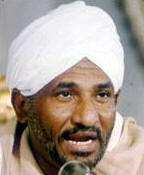Sudan opposition to push for inclusion in coalition
KHARTOUM, July 20 (Reuters) – Opposition political forces plan protests and strikes to try to force Sudan’s new coalition government to include a greater number of political voices, politicians told Reuters on Wednesday.
 About 10 Sudanese professional organisations and political parties, including the Popular National Congress, led by Islamist Hassan al-Turabi, and the Umma Party have formed an alliance with other parties to oppose the newly agreed coalition unity government.
About 10 Sudanese professional organisations and political parties, including the Popular National Congress, led by Islamist Hassan al-Turabi, and the Umma Party have formed an alliance with other parties to oppose the newly agreed coalition unity government.
“We want a national government not a bilateral government,” said Turabi, recently released from detention along with other political prisoners.
The alliance also includes pan-Arab secular parties like the Sudanese Baath Party and regional parties such as the Beja Congress, one of the main opposition parties in the east, where fighting has broken out between rebels and government soldiers.
The ruling National Congress Party (NCP) and former southern rebels of the Sudan People’s Liberation Movement (SPLM) agreed on the new government after signing a peace deal in January to end a 21-year-old civil war in Africa’s largest country.
Oppositions officials said the makeup of the government, which gives 52 percent of the government to the NCP, 28 percent to the SPLM and the remainder to other northern and southern parties, leaves too much power with the ruling elite.
The agreement, signed on July 9, makes SPLM leader John Garang first vice president of Sudan, but the opposition parties say they resent not being consulted on the allocation of power.
Abdur Rahman al-Ghali, deputy secretary-general of the Umma Party, said the alliance would organise strikes, protests and launch a media campaign to get its message to the public and to other countries.
The alliance politicians say they need a broad-based government before parliamentary and presidential elections are held in three to four years.
“To provide a basis for free and fair elections, we have to have a national government where everyone is represented, where the government that is holding power will refrain from interference in the election,” said Turabi, a former ally of President Omar al-Bashir.
Ghali said there were efforts underway to persuade the two main rebel groups fighting the government in the Darfur region to join the alliance.
The two groups launched a rebellion in early 2003. Among their complaints, they said the government gave preferential treatment to Darfur’s Arab tribes, who they accused of killing, burning villages and stealing their livestock.
Bashir’s government has accused Turabi of supporting one of the Darfur rebel groups. Turabi says he was in contact with the group to help find a political solution to the conflict that has killed tens of thousands and made about 2 million homeless.
